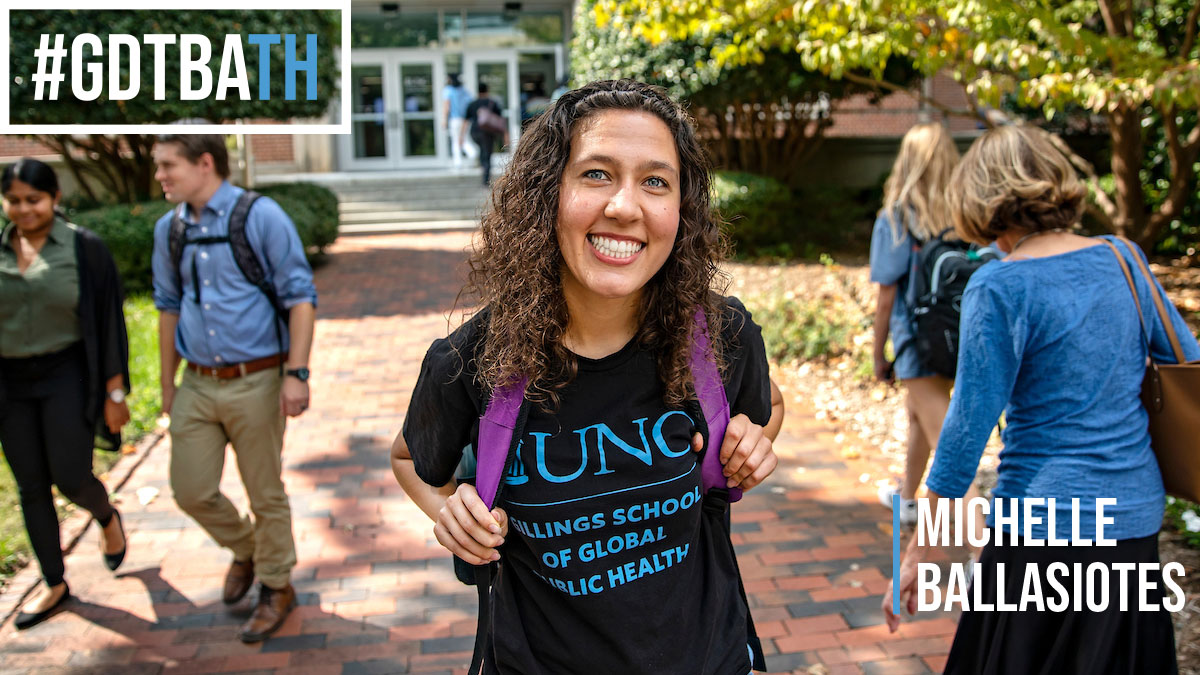#GDTBATH: Michelle Ballasiotes
Carolina student Michelle Ballasiotes is using her personal experience to raise awareness for pediatric strokes.

Most people don’t know that children can have strokes.
But having experienced the impact pediatric strokes have on children’s lives firsthand, Carolina student Michelle Ballasiotes is shining a spotlight on the issue.
“I’ve chosen to make my stroke a positive thing in my life, rather than dwell on the negatives and what I struggle with,” said Ballasiotes, who had a stroke while her mother was pregnant with her.
The senior health policy and management major spends her time conducting neurology research and advocating for changes to the U.S. health care system.
Ballasiotes, who grew up in Charlotte, noticed that many people didn’t know that children could have strokes, let alone while in utero. Using her personal story, she wanted to bring awareness to the danger. When she was only 8 years old, she spoke to members of the American Heart Association about her life experiences as a stroke survivor.
She has also traveled to Washington to inform legislators about pediatric strokes, to lobby for research funding for the National Institutes of Health and address the health care system.
She doesn’t want other families to face the same challenges as hers, like when her family was told she would have to see an expensive specialist instead of her local doctor. Her mom was able to fight for access to the local provider, but Ballasiotes knew many families didn’t have the resources to do so.
“I wanted to be able to educate others and say, ‘What is currently in place isn’t logical, and we need to fix it,’” Ballasiotes said.
When it came time for Ballasiotes to consider colleges, she instantly knew Carolina was the place for her, given its top-ranked public health school.
“The Gillings School of Global Public Health is one of the main reasons I wanted to come to Carolina,” she said.
While here, Ballasiotes has combined her personal experience with her studies to further raise awareness for pediatric stroke by creating “Pediatric Stroke Hero Bags” for patients at UNC Hospitals. The bags are full of resources, like toys to aid in the child’s recovery process and journals to help their parents relieve stress.
She even helped UNC Hospitals develop an emergency room protocol for patients who present with signs of pediatric stroke.
“We like to say that ‘time is brain’ when a child suffers a stroke,” Ballasiotes said. “It’s important for doctors to be able to recognize signs of stroke in children and treat them as rapidly as possible.”
This past summer, Ballasiotes extended her passion for public health by doing research with the UNC School of Medicine’s neurosurgery department, where she analyzed workplace accommodations for epilepsy patients.
Ballasiotes hopes to attend occupational therapy school after graduating from Carolina. It’s a path that stems from her own positive experiences working with an occupational therapist, both as a patient and as a colleague for educational presentations.
“My OT had an ability to make my therapy sessions fun, so I didn’t even know I was actually working,” Ballasiotes said. “It made me look forward to every appointment, and I want to provide that same motivation to other kids.”




